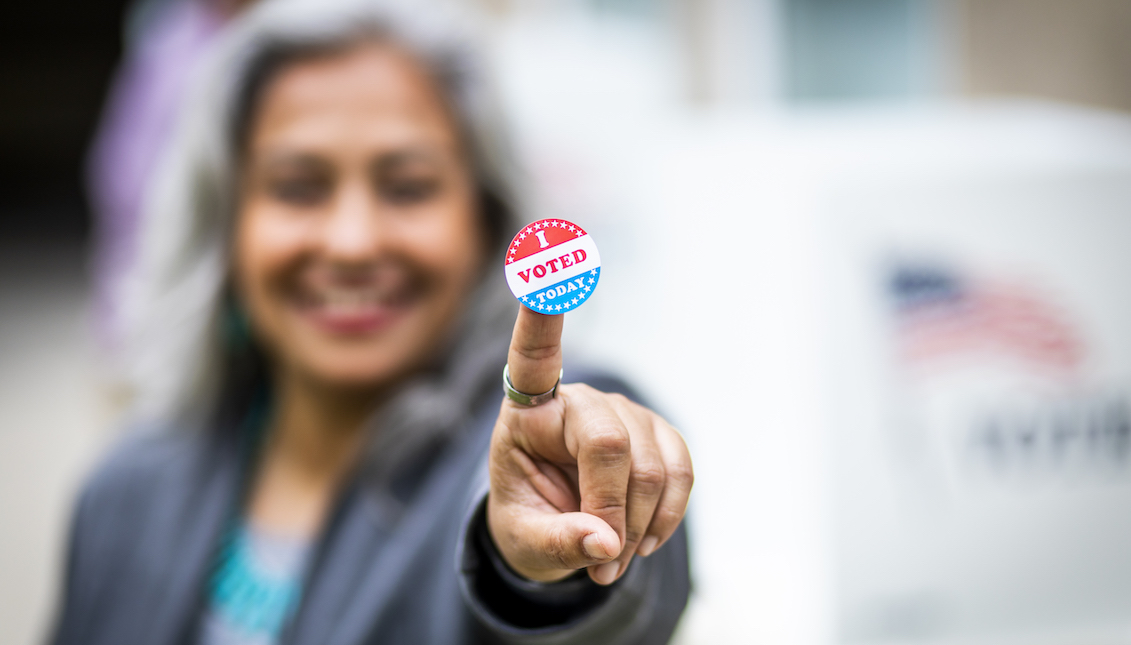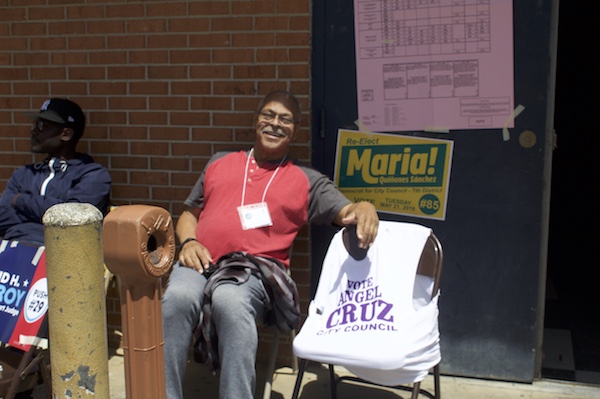
The Latino Vote: An Unprecedented Strength
From Philly to PA, and beyond, Latino voters could have an outsized impact at the polls this year. But who’s taking notice?
During the 2018 midterm, 27% of the Latinos who went to the polls were first-time voters and most were younger than 30 years old. Fast forward two years and one-in-ten Latino voters will be 18-23 years old.
Added to the growing number of young Latinos now eligible to vote is the fact that more Latinos have become naturalized citizens, leading to the exponential increase of eligible Latino voters. In 2012, only 48% of Latinos were eligible to vote. In 2020, that percentage has jumped to 79%.
The drastic increase in eligible voters can be linked to President Trump’s rhetoric on the Latino community during his presidential campaign.
Sixty-two percent of all Latinx voters lean towards the Democratic Party, but according to the Pew Research Center, nearly two-thirds of millennial Latinos, who were aged 18 to 35 in 2016, said they supported Hillary Clinton in the last election not because they agree with her, but rather because it was “a vote against Donald Trump.”
It’s a statement that was supported by 55% of the Latinx voters across all ages in 2016 and has prompted 52% of Latino voters to put “a lot of thought” on who they are going to elect in 2020.
We can cite numbers all day about how the Latino population is present and has grown in areas of the country it had never been before, but what they mean is that Latinos will play a major role in who gets elected come November.
The question remains, though, whether eligible Latino voters will register and cast their ballot on Election Day.
Take the City of Brotherly Love, for example.
In Philadelphia, according to its 2018 primary election statistics, there are close to 70,000 registered Latino voters. That’s compared to a total population of a little more than 220,000, per July 2018 census estimates.
A majority of the work to reach Philly’s Latino voters ahead of November 2020 falls to the many community organizations in contact with Latino communities throughout the city.
When some were asked about their engagement plans, many efforts grouped the census and voter registration together for 2020.
For example, long time nonprofit Congreso de Latinos Unidos has plans to host a joint census and voter registration event sometime in April to engage members of the community. According to Julia Rivera, director of external affairs at Congreso, they are also partnering with Telemundo to host a voter registration phone bank on March 18.
About ten minutes north in Hunting Park, Esperanza, another UnidosUS affiliate, told AL DÍA that it’s still in the planning phase to get some of its high schoolers registered to vote in 2020. Early ideas involve a civic day to engage the student body - almost 100% of which is Latino - about their roles as U.S. citizens.
The majority of Philly’s Latinos are Puerto Rican, a deeply-rooted community that has only grown since more than 900 Puerto Ricans moved to Philadelphia in the aftermath of Hurricane Maria which hit the island in Sept. 2017.
In Pennsylvania alone, 501,000 Latinx will be eligible to vote this year, which includes naturalized citizens. According to the U.S. Census Bureau, as of 2016, Puerto Ricans accounted for approximately half of the total Latino population in Pennsylvania, and the state was home to the fourth-highest Puerto Rican population in the country, numbering 444,263.

The numbers show that engaging Puerto Rican voters in Philadelphia and Pennsylvania as a whole is a key aspect of the presence of the Latino vote in the upcoming elections.
To that end, local grassroots organization Philly Boricuas has been working to engage Puerto Ricans in voting and pressuring elected officials to meet the demands and needs of Puerto Ricans both on and off the island.
Though the group has recently focused more on earthquake relief efforts for Puerto Rico, since they had their first public meeting on Oct. 26 the group has pushed for local Puerto Ricans to exercise their vote.
Philly Boricuas has joined with national organization Power 4 Puerto Rico to push the questions and hashtags, “#WhatsYourPuertoRicoPolicy” and “#ShowUsYourPuertoRicoPolicy” to demand that leading Democratic presidential candidates have a specific plan for addressing issues of austerity, natural disaster relief, and governance in the U.S territory. Some members of Philly Boricuas even confronted presidential candidate and Senator Amy Klobuchar at a rally in Fishtown on Nov. 4 about her campaign’s Puerto Rico policy.
By the end of March, the group plans to hold an event to encourage voting and break down candidate policies towards Puerto Rico.
Puchi DeJesus, organizer at Philly Boricuas, said that the group’s upcoming earthquake relief efforts, including a benefit concert at The Fire on Feb. 28, will also include a table complete with voter registration forms and candidate report cards based on their policies and how they will affect the people of Puerto Rico.
But some say it’s an uphill battle to ensure Puerto Rican voter turnout.
Since the Jones-Shafroth Act, in 1917, Puerto Ricans have been U.S citizens, and those living on the mainland are eligible to vote in the presidential election. The more than 3 million Puerto Ricans residing on the island are eligible to vote only during the primaries.
In the last decade, the number of Puerto Ricans living in the mainland has increased dramatically, turning them into the fastest-growing Hispanic-origin group, with 9.5% Latinx identifying as Boricuas — a figure that grew after both Hurricane Irma and María hit the island later that year, forcing thousands of Puerto Ricans to evacuate to the U.S.
Data from the Pew Research Center says that of the 6 million Puerto Ricans who make up the diaspora, based on 2013 statistics, more than half will be eligible to vote in the 2020 elections.
It’s a telling statistic that could impact states like Florida where, according to the Puerto Rico Report, close to 1.3 million Boricuas live.
If Puerto Rican nationals eligible to vote do so, the result could potentially alter the outcome of the swing state, wherein 2016 Trump defeated Clinton by less than 113,000 votes.
RELATED CONTENT
But compared to other Hispanic groups in the Sunshine State, Puerto Ricans have a lower voter turnout, with one study finding that just 62% of the 180,000 Puerto Ricans surveyed voted in 2016.
Groups like Vamos4PR are trying to counter low participation among Boricua voters on the mainland.
The action organization does not participate in direct voter registration but instead works with national organizations already focused on Latino voter registration — including VotoLatino, Power Latinx, Mi Familia Vota, and more — to provide the education that can spur eligible Puerto Rican voters to make informed decisions.
“Our main goal is to really focus on voter education and engagement and we believe that that will lead to a substantial increase in voter participation,” Javier Cuebas, executive director of Vamos4PR, told AL DÍA.
The network, born out of labor unions in 2015, is focused on economic injustice and looks specifically at issues faced by Puerto Rico in the aftermath of Hurricane Maria and the recent earthquakes, as well as what Cuebas calls the “man-made” disaster of the restructuring of Puerto Rico’s debt.

The organization worked in Florida and Wisconsin during the 2018 midterm elections and is now looking to make a difference in the Keystone State by educating and engaging PA Puerto Rican voters.
According to Cuebas, this demographic can be divided into two groups: “low-propensity voters”, Puerto Ricans who have lived in cities like Reading, Allentown, and in the Lehigh Valley Area for three or more generations but have not been politically engaged; and “new arrivals,” or Puerto Ricans who recently moved to the mainland in the aftermath of Hurricane Maria.
Approximately 2,000 Puerto Rican families moved to Pennsylvania after Hurricane Maria, making it the state with the second-highest number of Puerto Ricans displaced by the natural disaster.
Cuebas believes that the more that the Puerto Rican community understands the power of their numbers both locally and nationally, the better.
“Once people realize the power they have in numbers, they get that extra level of motivation,” he said.
Cuebas acknowledged that it’s been “a very hard two years for Puerto Rico.”
Though some Puerto Ricans Vamos4PR speaks with might feel disenchanted with the political process, Cuebas said that the goal is that voters walk away from their conversation saying, “‘Ok, my vote is going to matter.”
The end goal is not only that eligible Puerto Rican voters come to the polls, but also that they stay engaged politically and hold officials accountable to their promises after elections.
“Once people understand the connection between them voting and being able to prevent some of the challenges that they have gone through, it makes a big difference,” Cuebas said.










LEAVE A COMMENT:
Join the discussion! Leave a comment.